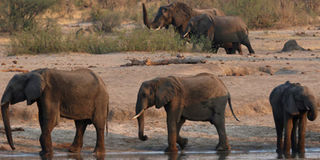Zimbabwe to cull 200 elephants to feed people left hungry by drought

A group of elephants are seen near a watering hole inside Hwange National Park, in Zimbabwe. PHOTO | REUTERS
What you need to know:
- The cull, the first in the country since 1988, will take place in Hwange, Mbire, Tsholotsho and Chiredzi districts.
Harare. Zimbabwe plans to cull 200 elephants to feed communities facing acute hunger after the worst drought in four decades, wildlife authorities said on Tuesday.
The El Nino-induced drought wiped out crops in southern Africa, impacting 68 million people and causing food shortages across the region.
"We can confirm that we are planning to cull about 200 elephants across the country. We are working on modalities on how we are going to do it," Tinashe Farawo, Zimbabwe Parks and Wildlife Authority (Zimparks) spokesperson, told Reuters.
He said the elephant meat would be distributed to communities in Zimbabwe affected by the drought.
The cull, the first in the country since 1988, will take place in Hwange, Mbire, Tsholotsho and Chiredzi districts. It follows neighbouring Namibia's decision last month to cull 83 elephants and distribute meat to people impacted by the drought.
More than 200,000 elephants are estimated to live in a conservation area spread over five southern African countries - Zimbabwe, Zambia, Botswana, Angola and Namibia - making the region home to one of the largest elephant populations worldwide.
Farawo said the culling is also part of the country's efforts to decongest its parks, which can only sustain 55,000 elephants. Zimbabwe is home to over 84,000 elephants.
"It's an effort to decongest the parks in the face of drought. The numbers are just a drop in the ocean because we are talking of 200 (elephants) and we are sitting on plus 84,000, which is big," he said.
With such a severe drought, human-wildlife conflicts can escalate as resources become scarcer. Last year Zimbabwe lost 50 people to elephant attacks.
The country, which is lauded for its conservation efforts and growing its elephant population, has been lobbying the U.N.'s Convention on International Trade in Endangered Species (CITES) to reopen trade of ivory and live elephants.
With one of the largest elephant populations, Zimbabwe has about $600,000 worth of ivory stockpiles which it cannot sell.





